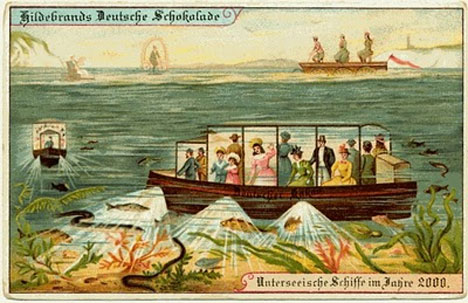 |
| A weather machine clearing cloud cover in the year 2000. |
So, of course, here are my predictions for the new year.
The world economy will be back on track this year, thanks to fracking. We are at the beginning of a boom. The US, in particular, will do very well.
 |
| Private flying machines in the year 2000. |
Conversely, traditional oil suppliers will be doing less well. This won’t matter much in the Gulf, where supplies are large and accessible, and the governments have built in a cushion. Low oil prices will not reignite the Arab Spring. The results of that movement have been disappointing, so young Arabs are unlikely to try it soon again. It will matter a lot in Russia, Iran, and Venezuela. These three governments have already looked shaky. Any one of them, or all, may fall this year. Cuba, dependent on Venezuela, is also vulnerable.
The odds of the government of China falling go down with the lower cost of oil; on the other hand, the protests in Hong Kong continue, and they carry a grave risk of contagion.
Now that the world is awake to the threat of ISIS, I do not expect them to be able to make any further headway. They will be slowly beaten back over the next year. This means too that the government of Syria probably will not fall.
The free trade deal between Canada and the EU almost necessitates a similar deal between the US and the EU. I don’t know what stage those negotiations are at. When it comes—soon—it will be a big boost to the world’s economy.
With the death of Steve Jobs, Google has established itself as the clear leader in high-tech. It should continue to rise in prominence and profitability.
I get the idea that we are very close to some breakthroughs in life extension. Something may break this year.
We are also close to a sudden drop in health care costs. It is a closely-held secret, but the fact is, computer software is now better at diagnosing illnesses than are human MDs. MDs are fantastically expensive, and there is no more justification for using them, but for surgeons. This will be bad news for the medical profession, of course, but good news for everyone else.
Education costs should also soon nosedive. We now know that online education outperforms the classroom model; and, again, it is exponentially cheaper.
The odds of the government of China falling go down with the lower cost of oil; on the other hand, the protests in Hong Kong continue, and they carry a grave risk of contagion.
Now that the world is awake to the threat of ISIS, I do not expect them to be able to make any further headway. They will be slowly beaten back over the next year. This means too that the government of Syria probably will not fall.
 |
| Underwater tour bus in the year 2000. |
The free trade deal between Canada and the EU almost necessitates a similar deal between the US and the EU. I don’t know what stage those negotiations are at. When it comes—soon—it will be a big boost to the world’s economy.
With the death of Steve Jobs, Google has established itself as the clear leader in high-tech. It should continue to rise in prominence and profitability.
I get the idea that we are very close to some breakthroughs in life extension. Something may break this year.
We are also close to a sudden drop in health care costs. It is a closely-held secret, but the fact is, computer software is now better at diagnosing illnesses than are human MDs. MDs are fantastically expensive, and there is no more justification for using them, but for surgeons. This will be bad news for the medical profession, of course, but good news for everyone else.
Education costs should also soon nosedive. We now know that online education outperforms the classroom model; and, again, it is exponentially cheaper.
 |
| Amphibious ship-train in the year 2000. |













No comments:
Post a Comment